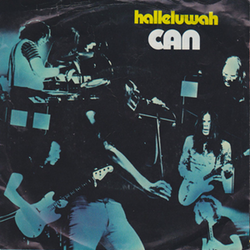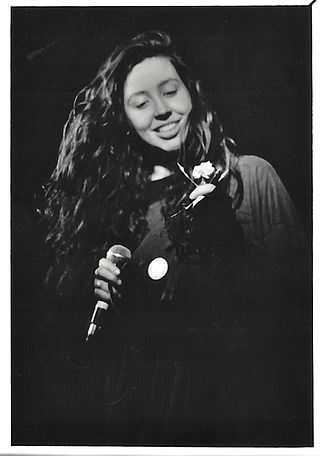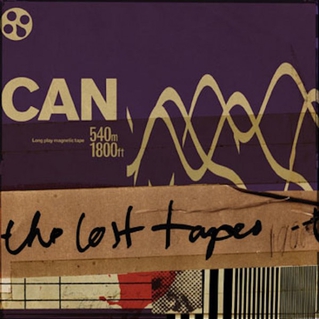Related Research Articles

The Mooney Suzuki is an American garage rock band that formed in New York City in 1996. Originally comprising vocalist and guitarist Sammy James Jr., guitarist Graham Tyler, bassist John Paul Ribas and drummer Will Rockwell-Scott, the band has released four studio albums – People Get Ready (2000), Electric Sweat (2003), Alive & Amplified (2004) and Have Mercy (2007). The current lineup includes founding members James and Rockwell-Scott, guitarist Chris Isom, and bassist Reno Bo.

Can were a German experimental rock band formed in Cologne in 1968 by Holger Czukay, Irmin Schmidt (keyboards), Michael Karoli (guitar), and Jaki Liebezeit (drums). They featured several vocalists, including the American Malcolm Mooney (1968–70) and the Japanese Damo Suzuki (1970–73). They have been hailed as pioneers of the German krautrock scene.

Irmin Schmidt is a German keyboardist and composer, best known as a founding member of the band Can.

Kenji Suzuki, known as Damo Suzuki (ダモ鈴木), was a Japanese musician best known as the vocalist for the German Krautrock group Can between 1970 and 1973. Born in 1950 in Kobe, Japan, he moved to Europe in the late 1960s where he was spotted busking in Munich, West Germany, by Can bassist Holger Czukay and drummer Jaki Liebezeit. Can had just split with their vocalist Malcolm Mooney, and asked Suzuki to sing over tracks from their 1970 compilation album Soundtracks. Afterwards, he became their full time singer, appearing on the three influential albums Tago Mago (1971), Ege Bamyası (1972) and Future Days (1973).

Tago Mago is the second studio album by the German krautrock band Can, originally released as a double LP in August 1971 on United Artists Records. It was the band's first full studio album to feature vocalist Damo Suzuki after the departure of Malcolm Mooney the year prior, though Suzuki had been featured on most tracks on the 1970 compilation album Soundtracks. Recorded at Schloss Nörvenich, a medieval castle near Cologne, the album features long-form experimental tracks blending rock and jazz improvisation, funk rhythms, and musique concrète tape editing techniques.

Ege Bamyası is the third studio album by German krautrock band Can, released on 29 November 1972 by United Artists Records. The album contains the single "Spoon", which charted in the Top 10 in Germany after being used as the theme song to the German television mini-series Das Messer. The success of the single allowed Can to establish their own studio, Inner Space, in Weilerswist, North Rhine-Westphalia, where they recorded the rest of the album.

Soundtracks is a 1970 compilation album by the German krautrock group Can, containing music written for various films. The album marks the departure of the band's original vocalist Malcolm Mooney, who sings on two tracks, and his replacement by Damo Suzuki. "Don't Turn the Light On, Leave Me Alone" features Suzuki's first recorded performance with the band. Stylistically, the record also documents the group's transition to the more meditative and experimental mode of the studio albums that followed.

Future Days is the fourth studio album by the German experimental rock group Can, released on 1 August 1973 by United Artists. It was the group's final album to feature vocalist Damo Suzuki, who subsequently left the band, and explores a more atmospheric sound than their previous releases.

Mani Neumeier is a German rock musician, free-jazz drummer, artist, and frontman of the German Krautrock-band Guru Guru.

"Halleluwah" is a song by the krautrock band Can, from their 1971 album Tago Mago. The track, which originally took up a whole side of long-playing vinyl record, lasts for 18 minutes and 28 seconds and is characteristic of the band's sound around 1971 in that it features a vast array of improvised guitars and keyboards, tape editing, and the rhythm section "pounding out a monster trance/funk beat". The drum beat for which the song is famous is repeated almost continuously by Jaki Liebezeit, with only minor variations, throughout the course of the 18-minute jam. In one line of the song, Damo Suzuki's lyrics mention all the songs from side one of Tago Mago: "mushroom head, oh yeah, paper house."
"Mushroom" is a song by the German krautrock band Can, from their 1971 album Tago Mago. It's the shortest song on the album, with a duration of 4 minutes and 8 seconds. A video was made for the track which has been shown on MTV.

Please Heat This Eventually is a 12" EP from Gold Standard Laboratories and is a collaboration between Omar Rodríguez-López Group and Damo Suzuki of the group Can. It features both live performance of the group with Suzuki in Cologne, Germany on November 14, 2005, and studio recorded elements arranged together into one extended piece. The EP consists of a single 25-minute track split up over both sides of the record. Parts 1, 2, and 3 appear on side 1 and parts 4, 5, and 6 appear on side 2. It was released commercially on January 23, 2007 on vinyl, though GSL pre-orders began shipping in December 2006.

Th' Faith Healers were an English indie rock band who were originally active between 1990 and 1994. They recorded multiple EPs and singles along with two full LPs.
Mugstar are an English rock band, influenced by kraut/psych/space/noise rock such as Oneida, Sonic Youth, Neu! and Hawkwind. Since 2003 they have issued several full-length albums, a split release with Mudhoney and two live albums performing on stage together with Damo Suzuki. Mugstar recorded one of the last-ever Peel Sessions with the late John Peel on 5 May 2004. Record labels: Rock Action, Important Records (U.S.A.), Cardinal Fuzz, Weird Beard, Agitated, Evil Hoodoo, Rocket Recordings, Trensmat, God Unknown, Chunklet Industries (U.S.A.), Hands In The Dark / All Time Low, Lancashire & Somerset, critical MASS...

Anthology, also called Anthology - 25 Years and Anthology 1968-1993, is a compilation double album by Krautrock artists Can which was released in 1994. Several of the songs are presented in edited form. The first CD has the same track listing as Can's previous compilation, Cannibalism.

Unlimited Edition is a compilation album by the band Can. Released in 1976 as a double album, it was an expanded version of the 1974 LP Limited Edition on United Artists Records which, as the name suggests, was a limited release of 15,000 copies. The album collects unreleased music across the band's history, from 1968 to 1975, and both of the band's major singers are featured. The cover photos were taken among the Elgin Marbles in the Duveen Gallery of the British Museum.

The Lost Tapes is a compilation album of studio outtakes and live recordings by the German experimental rock band Can, which was originally released as an LP in 2012 by Spoon Records in conjunction with Mute Records. The compilation was curated by Irmin Schmidt and Daniel Miller, compiled by Irmin Schmidt and Jono Podmore, and edited by Jono Podmore.
"I Am Damo Suzuki" is a song by the English post-punk band The Fall released on their 1985 album This Nation's Saving Grace. It was written in tribute to the Japanese expat vocalist Damo Suzuki of the Krautrock group Can, whom Fall vocalist Mark E. Smith consistently described as a major influence.

Lido is the debut album by the English band th' Faith Healers, released in 1992. The band promoted the album in the United States by touring with the Dentists.
The Japanese musician Damo Suzuki performed on the following incomplete list of albums and soundtracks:
References
- 1 2 Strong, Martin C. (1999) "The Great Alternative & Indie Discography", Canongate, ISBN 0-86241-913-1
- ↑ Wittmershaus, Eric "Can's 'Mother Sky' performed by Th' Faith healers", Flak Magazine